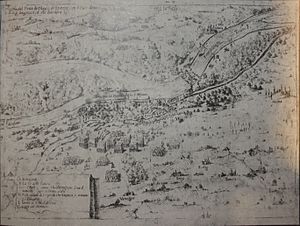Battle of Tornavento facts for kids
Quick facts for kids Battle of Tornavento |
|||||||
|---|---|---|---|---|---|---|---|
| Part of Franco-Spanish War (1635) | |||||||
 The battle of Tornavento in a seventeenth-century graphic representation |
|||||||
|
|||||||
| Belligerents | |||||||
| Commanders and leaders | |||||||
| Strength | |||||||
|
16,700 |
14,500
|
||||||
| Casualties and losses | |||||||
| 2,000 | 4,000 | ||||||
The Battle of Tornavento was an important fight that happened in Northwest Italy on June 22, 1636. It was part of a bigger conflict called the Thirty Years' War. In this battle, armies from France and Savoy fought against the Spanish army.
Before the Battle
In 1636, a powerful French leader, Cardinal Richelieu, convinced the Duke of Savoy, Vittorio Amedeo I, to attack the Spanish-controlled area of Milan. A French army crossed the Ticino river near the towns of Oleggio and Lonate Pozzolo. However, they were stopped by a larger Spanish army. The French soldiers then dug into their positions, waiting for their allies from Savoy to arrive.
On June 22, the Spanish army attacked the French lines. The French managed to hold them back until the army of Duke Victor Amadeus I arrived. The fighting was very intense and bloody, happening in the hot summer weather. Spanish officers described the battlefield as a "treeless, and lacking water" area.
The battle started at 8:00 AM. The Spanish made several attacks on the French and Savoyard soldiers. These soldiers had fortified their positions on a slope. Both sides dug trenches and built up earthworks to protect themselves. The fighting often involved small groups exchanging gunfire. Sometimes, it turned into fierce hand-to-hand combat.
By the evening, the Spanish attacks had been pushed back. The French and Savoyard forces took back all their original positions. The two sides then exchanged gunfire for a long time, but it didn't change much. Some fighting continued even after the sun went down.
There were many casualties on both sides. The Spanish commander, Leganés, realized he couldn't defeat the enemy, who were dug in and slightly fewer in number. He decided to save his army by retreating under the cover of darkness.
A Clever Retreat
To make sure his army wasn't followed, Leganés used a clever trick. He had his soldiers place hundreds of pikes (long spears) upright in the ground behind their trenches. This made it look like a large force was still there. He also placed hundreds of muskets next to the pikes, with their lit wicks glowing in the dark.
He also left a small group of soldiers called dragoons behind. Their job was to move along the enemy line and fire their muskets all night long. This made the French and Savoyard armies think the Spanish were still there in force. The retreat worked perfectly, and the Spanish left without losing any supplies or cannons.
The French and Savoyard commanders, Victor-Amadeus and Créquy, felt their armies were exhausted. They thought it was "miraculous" that they had managed to stop the Spanish attacks. Because of this, they chose not to chase the retreating Spanish army.
Aftermath
The Spanish army left the battlefield and went to Boffalora. The French and Savoyard army stayed near Tornavento for a few days. They looted nearby towns and damaged a canal. However, they soon decided to leave the Milanese territory.
In the end, this battle didn't achieve much. The invasion of the Lombardy region (where Milan is) was a complete failure. The battle lasted about 14 hours. During that time, the French and Savoyard army alone used about 30,000 pounds of gunpowder. This means they fired around 675,000 bullets!
Reenactment
Every year, in the small town of Tornavento, volunteers hold a colorful and exciting reenactment of the battle. They dress in uniforms and use weapons from that time, like pikes, muskets, and cannons. It's a great way to see history come alive!
See also
 In Spanish: Batalla de Tornavento para niños
In Spanish: Batalla de Tornavento para niños
 | Selma Burke |
 | Pauline Powell Burns |
 | Frederick J. Brown |
 | Robert Blackburn |

